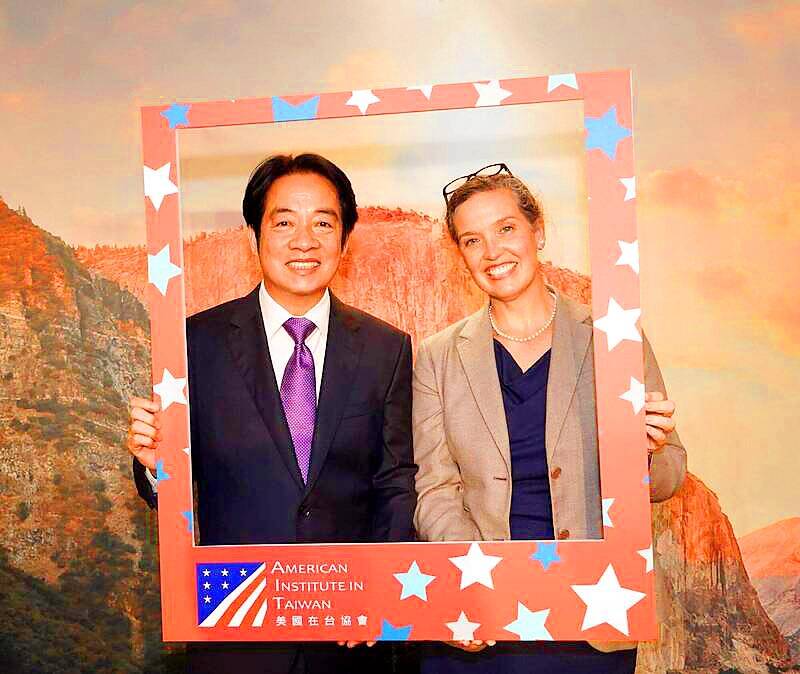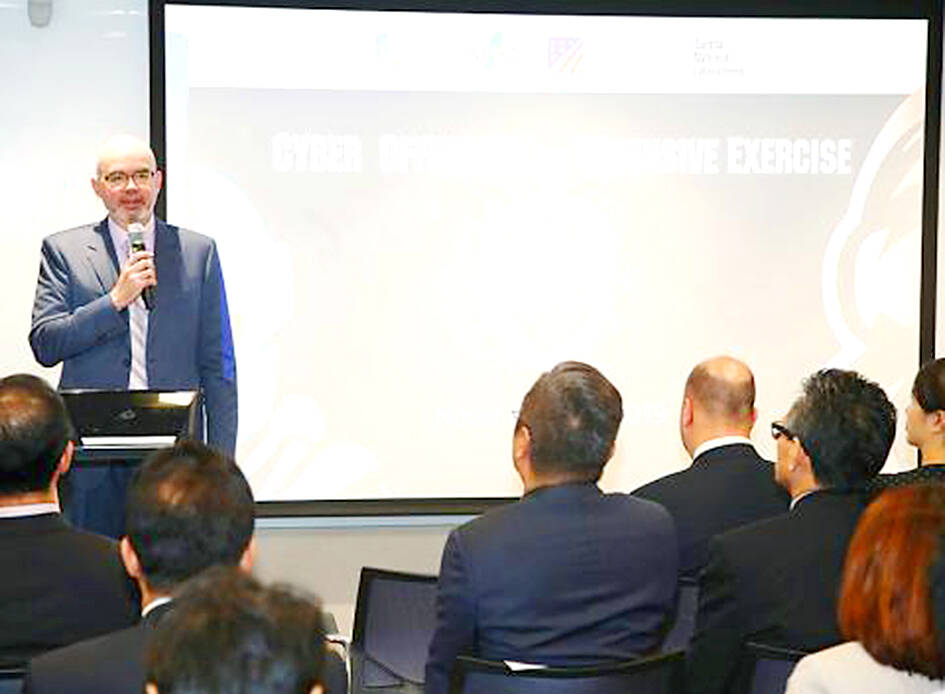A staunch friend of Taiwan is to take over this summer as the top US diplomat in Taipei, three sources briefed on the matter said, roughly coinciding with president-elect William Lai (賴清德) taking office.
The sources, who spoke on condition of anonymity as they were not authorized to speak to the media, said that Raymond Greene, currently deputy chief of mission at the US embassy in Tokyo, is to replace Sandra Oudkirk as director of the American Institute in Taiwan (AIT).
The AIT handles relations between the US and Taiwan in the absence of official relations.

Photo: screen grab from the American Institute in Taiwan’s Facebook page
Career diplomat Greene, who was deputy head of the AIT before going to Japan, would be the de facto US ambassador in Taipei.
The AIT referred questions to the US Department of State, which did not respond to a request for comment.
“Greene is viewed here as a staunch friend of Taiwan’s and knows Taiwan well,” one of the sources said.

Photo: CNA
A second source said Greene, who speaks both Japanese and Mandarin, would also be able to serve as a useful conduit between Taiwan and Japan, given Tokyo’s concerns about possible Chinese military action.
Greene would be assuming his new role as Lai takes charge.
It was not clear exactly when Greene would take up his role, but the sources said it would be this summer when Oudkirk’s term is up. She took the role in July 2021.
Greene was previously the US consul general in the southwestern Chinese city of Chengdu and Japan’s Okinawa, home to a US military base that lies not far from Taiwan.
In 2021, shortly before moving from Taipei to Tokyo, Greene said in a speech that when he first worked in Taiwan two decades ago, everything AIT did related back to cross-strait issues and how Taiwan fits into the US-China relationship, but over the preceding three years, efforts had been overwhelmingly focused on deepening ties and working together to help other nations develop their economies and democratic institutions.
“The United States no longer sees Taiwan as a ‘problem’ in our relations with China, we see it as an opportunity to advance our shared vision for a free and open Indo-Pacific, and also as a beacon to peoples around the world who aspire for a more just, safe, prosperous and democratic world,” Greene said.
The US holds its presidential election in November, in what could be another uncertain factor for relations, although the Ministry of Foreign Affairs last week said that it believed US support would remain unchanged no matter who won.

Taiwan is stepping up plans to create self-sufficient supply chains for combat drones and increase foreign orders from the US to counter China’s numerical superiority, a defense official said on Saturday. Commenting on condition of anonymity, the official said the nation’s armed forces are in agreement with US Admiral Samuel Paparo’s assessment that Taiwan’s military must be prepared to turn the nation’s waters into a “hellscape” for the Chinese People’s Liberation Army (PLA). Paparo, the commander of the US Indo-Pacific Command, reiterated the concept during a Congressional hearing in Washington on Wednesday. He first coined the term in a security conference last

Prosecutors today declined to say who was questioned regarding alleged forgery on petitions to recall Democratic Progressive Party (DPP) legislators, after Chinese-language media earlier reported that members of the Chinese Nationalist Party (KMT) Youth League were brought in for questioning. The Ministry of Justice Investigation Bureau confirmed that two people had been questioned, but did not disclose any further information about the ongoing investigation. KMT Youth League members Lee Hsiao-liang (李孝亮) and Liu Szu-yin (劉思吟) — who are leading the effort to recall DPP caucus chief executive Rosalia Wu (吳思瑤) and Legislator Wu Pei-yi (吳沛憶) — both posted on Facebook saying: “I

Sung Chien-liang (宋建樑), who led efforts to recall Democratic Progressive Party (DPP) Legislator Lee Kun-cheng (李坤城), was released on bail of NT$80,000 today amid outcry over his decision to wear a Nazi armband to questioning the night before. Sung arrived at the New Taipei District Prosecutors’ Office for questioning in a recall petition forgery case last night wearing a red armband bearing a swastika, carrying a copy of Adolf Hitler’s Mein Kampf and giving a Nazi salute. Sung left the building at 1:15am without the armband and covering the book with his coat. Lee said today that this is a serious

A mountain blaze that broke out yesterday morning in Yangmingshan National Park was put out after five hours, following multi agency efforts involving dozens of fire trucks and helicopter water drops. The fire might have been sparked by an air quality sensor operated by the National Center for High-Performance Computing, one of the national-level laboratories under the National Applied Research Laboratories, Yangmingshan National Park Headquarters said. The Taipei City Fire Department said the fire, which broke out at about 11am yesterday near the mountainous Xiaoyoukeng (小油坑) Recreation Area was extinguished at 4:32pm. It had initially dispatched 72 personnel in four command vehicles, 16